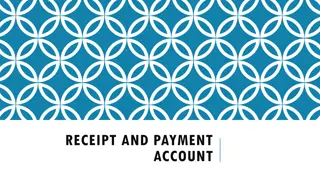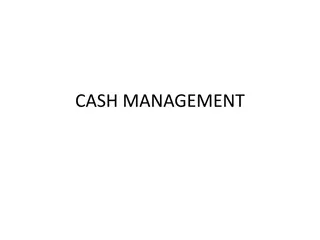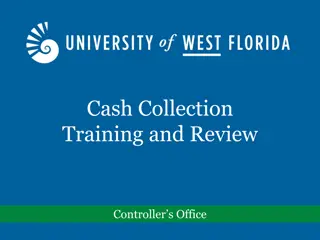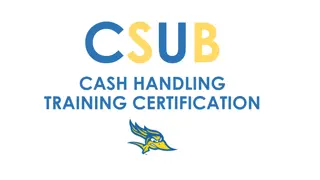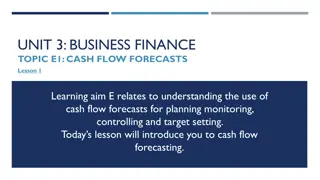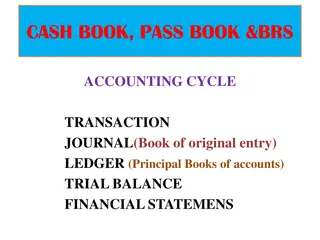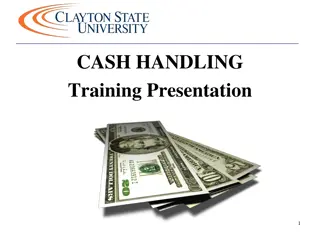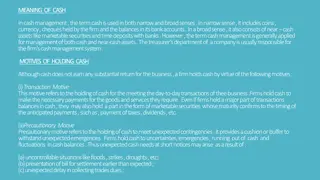Understanding Special Purpose Books: Cash Management Module
Exploring the significance of maintaining subsidiary books and the advantages they offer in managing cash transactions efficiently. Learn about the different types of cash books, their functions, and important entries like contra entries. Enhance your understanding of bookkeeping practices for financial accuracy.
Download Presentation

Please find below an Image/Link to download the presentation.
The content on the website is provided AS IS for your information and personal use only. It may not be sold, licensed, or shared on other websites without obtaining consent from the author. Download presentation by click this link. If you encounter any issues during the download, it is possible that the publisher has removed the file from their server.
E N D
Presentation Transcript
Special Purpose books: cash book MODULE 1/2
Books of Original Entry/Special Purpose Books As the business grows and number of transactions increase, it becomes necessary for the necessary for the business to divide the recording work. The books maintained are illustrated below: Transactions Further classification Subsidiary Books Maintained Only Cash Simple Cash Book Cash & Bank Related Transactions Cash & Bank Transactions Double Column Cash book Cash payment of small amount Petty Cash Book Credit Sale Sales Book Transaction Other than Cash & Bank Credit Purchases Purchases Book Sales Returns/ Returns Inward Sales returns Book Purchases Returns /Returns outward Purchases Returns Book
Advantages of Maintaining Subsidiary Books Division of work Leads to Specialization Easy to maintain Ledger Check on frauds Easy to fix responsibility Quick availability of required information.
Cash Book, Simple Cash Book Cash Book Cash book shows all the transactions related to cash receipts and payments. Cash book serves two purposes. First, all the cash transactions are recorded first time in cash book it becomes Book of original entry. Second, there is no need to prepare Cash a/c in ledger it also play the role of Principal Book. Simple Cash Book All the cash receipts are shown in left hand side i.e. Debit side and all the cash payments are shown in right hand side i.e. Credit Side.
Points to Remember Cash in hand/opening balance of cash is shown in Dr. side of the Cash book as To Balance b/d Only transactions of cash receipts and payments are recorded in this book. This book never shows a credit balance because one can t pay more than the cash one have.
Cash Book with Cash and Bank Column In this case the Cash Book is ruled with two amount columns on either side of the cash book namely, "Cash and Bank". Cash columns in such a case will record actual cash received in the debit side and payments in the credit side. Cheques received should be entered on the debit side. The payments by cheques should be entered on the credit side in bank column and also when cash is withdrawn from the bank.
Important Entries Contra Entries : These entries affect cash and bank columns both at the same time. To indicate contra entry C is mentioned in the L.F. column of the cash Book. Following two cases result in Contra entries. (a) Depositing cash into Bank Rs. 1,000 It will increase bank balance, so bank column is debited and flash balance will decrease, so cash column is credited. (b) Withdrawn from Bank for office use Rs. 1,000. It will increase cash balance, so cash column is debited and bank balance will decrease, so bank column is credited.
(2) Entries relating to cheques : When any payment is made by cheque : It will reduce the bank balance and thus bank column will be credited. When any receipt is made by cheque : It will entered as cash in hand Dr. side
Petty Cash Book Business has to incur small expenses which are repetitive in nature. To save the time and efforts of head cashier, business appoints a petty cashier. He is entrusted with the duty of paying these expenses.
Imprest System of Petty Cash Book Under this system, Head cashier gives a fixed amount to petty cashier for a definite period. At the end of given period, Head cashier reimburses the amount actually spent by the petty cashier resulting the same amount with petty cashier which he had in the beginning of the period.
Advantage of Petty Cash Book Saving of time and efforts of Head cashier Control on Petty expenses. Less chances of fraud.


